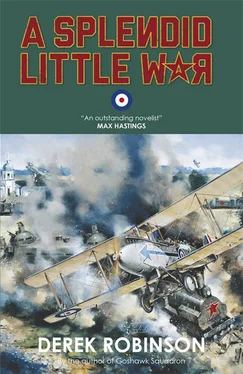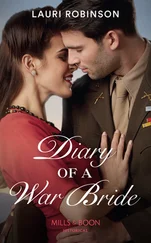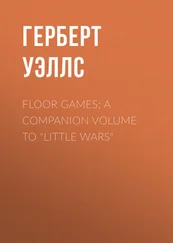“Reports on all fronts of the war. About Admiral Kolchak’s campaigns in Siberia, it says results are difficult to estimate , which means…”
“Nobody knows,” Wragge said. “And nobody’s holding their breath.”
“About the North Army at Murmansk, it says morale is good , however the outcome has yet to be decided , meaning…”
“Nobody knows,” Wragge said. “But we’re not winning.”
“In Estonia, next to Petrograd, an ugly piece of work called General Yudenitch aims to be a new Ivan the Terrible. The report describes him as staunch and unswerving , translated as brutal and ruthless . Will he win? H.Q. is observing the situation closely.”
“Because nobody knows. And Estonia can’t conquer Russia, so it’s Denikin or nothing, isn’t it?”
“They’re quite candid about Denikin. His goal of a One and Undivided Russia is a brave gamble, they say.”
“He’s a reactionary,” Borodin said. “A good soldier but a woeful politician. Can’t administer the territory he captures. Doesn’t even try.”
“H.Q. speaks highly of the generals on his flanks,” Lacey said. “Wrangel on the right and Mai-Mayevski on the left.”
“They hate each other,” Borodin said. “Mai-Mayevski is useless when drunk, which is often.”
“Nevertheless,” Wragge said, “Denikin’s armies have smashed the Reds and he’s off and running for Moscow. Where is his Front?”
“Situation fluid,” Lacey said. “Opinions vary.”
“What an odd war. Nobody knows anything. Oh, well. What has H.Q. to say about Russian politics, Count?”
“They copied it from the Encyclopaedia Britannica ,” Borodin said, “which has long since been overtaken by events. For instance, the Britannica and H.Q. say the peasants are ignorant of Western civilization, hence the power of the nobility. But the peasants have taken their estates and the nobility have no power. Whoever wrote this doesn’t understand the Revolution.”
“Too deep for me, old boy,” Wragge said. “And I don’t really give a damn. We get paid to biff the Bolos and that’s all that matters. Incidentally, I’ve decided to make Dextry the new Camel Flight leader. Count, you’ll fly the replacement Camel, after you’ve had a little training.”
“Thanks awfully.”
“Why are we stopping?”
Lacey went to the window. “We’re in a siding. Why, I have no idea.”
The answer soon became obvious. Expresses thundered past, one after another. “This is absurd,” Wragge said. “We have priority status. My orders say everything makes way for us. But look!” More high-speed trains sped by.
“The railway authorities make these decisions,” Borodin said. “I rather think they told your Mission H.Q. what H.Q. wished to hear. It was an untruth, of course.”
Wragge stared. “That’s absolutely bloody ludicrous.”
Borodin nodded. “Puzzling for strangers, but not at all uncommon in Russia.”
“God speed the plough.” Wragge looked at Lacey, but Lacey had rolled the Strategic Overview into a tube and was softly blowing into it. “Thank you,” Wragge said. “That’s all.”
Borodin and Lacey left the train and stood in the sunshine. Half the squadron was out there, kicking a football about. Kid, the mascot, was eating young thistles.
“You hate the Reds,” Lacey said. “Ghastly lot of murderers.”
“You have no idea just how ghastly. Not yet.”
“Quite. But you despise the White leaders.”
“They want the old days back again. Greedy and stupid.”
“Well, that’s what puzzles me. You accept the Revolution, yet fight the Bolsheviks. Why is that?”
“Look at me, Lacey.” Borodin spread his arms. “The Imperial Empire made me. It was a scarecrow with a crown on its turnip head, but it made me, it raised me, it was all I knew. I am a member of that tribe, and sometimes a man has to fight for his tribe.”
“Even when he fears it won’t win?”
“Even when he knows it must lose.” Borodin smoothed his tunic. “And that is the last we shall ever speak of such things.”
The locomotive whistle gave a warning blast. Men began climbing aboard. “Off to the wars,” Lacey said. “Shall we have an aperitif before lunch?”
2
The squadron reached the town of Makeyevka late in the afternoon. They had covered ninety-four miles, much of it spent waiting in sidings. The drivers decided they had done enough.
Wragge asked the adjutant to assemble the whole squadron on the station platform — everyone, including ground crews and Marines. “We left the Marines at Tag,” Brazier said. “H.Q. said we shan’t need them. Denikin’s staff will send an armoured train to protect us. Apparently the main danger is from enemy armoured trains.”
“I see. How do we tell the difference between ours and theirs?”
Brazier looked at his watch. “Gracious. Is that the time? I’d better get the troops on parade.”
“Not a parade, Uncle. Just assemble them.”
He found a box to stand on. The size of the crowd sobered him. Until Russia, he had risen no higher than flight leader, responsible for half a dozen pilots. Now he was looking at well over a hundred men.
“I’ll make this short and sweet,” he said. “Well, I hope it’s sweet. Two things. First is why we’re here, and that is to fly aeroplanes. Your job, all of you, is to help us do that. If you’re not helping, you’re hindering. Do it your way, do it any damned way you like, but keep Merlin Squadron flying. Second: let’s enjoy it. Any fool can make war miserable. We’re a long way from home, but let’s get as much fun as we can out of being in this peculiar country. That’s all. Carry on, adjutant.”
Wragge beckoned to the count.
“There’s a Russian official watching us,” Wragge said. “See him? Too fat for his fancy uniform. Could he be the stationmaster?”
“Almost certainly.”
“Ask him what happened to our express-train status.”
The stationmaster saw them coming and his fingers thought about buttoning his coat, fumbled, and gave up. Borodin asked him a question and got a short and surly answer. “Wrong identification letters on the front of our locomotives,” Borodin reported. “Nothing he can do.”
“I see. How would General Denikin handle this situation?”
Borodin laughed. “Hang him.”
“And the Red Army?”
“Torture, and then hang him.”
“Interesting. Would it make the trains run faster? Don’t answer that, it was a thingummy question.”
“Rhetorical.”
“If you say so. We’ll compromise. We’ll tie the bugger to the front of the locomotive and leave him there. He’ll make a very good identification. He’ll clear the line like a dose of salts. We’ll go like a rocket.”
“Yes.” Borodin thought about that. “And if it fails? We might hit a train in front of us.”
“Then the stationmaster will be the first to know. Tell him.”
Borodin translated. The man seemed baffled by the news. He protested loudly and a gang of plennys led him to the locomotive of “A” Flight’s train and roped him to the front. “He says this is outrageous,” Borodin told Wragge.
“So is hanging about in sidings. We’ll leave him there for the night. Give him time to brood. Russians are good at brooding, aren’t they?”
3
Wragge gave all ranks one hour to stretch their legs and see something of Makeyevka. Count Borodin asked the squadron doctor if she would like to go, and if he might escort her. “I won’t suggest that we take the air,” he said. “In these parts, breathing is something to be avoided.”
They took a droshky . Slag heaps and factory chimneys dominated the landscape. Rusting railway tracks wandered off and got lost. The air smelt of burnt carbon and tasted of sulphur. “If you lived here for fifty years you’d never grow to love it,” she said, “because you’d be dead by forty.”
Читать дальше











